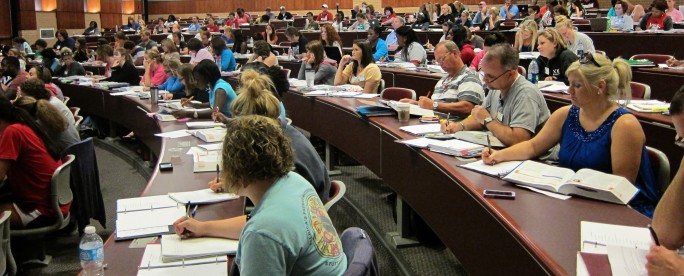Students may not disturb normal classroom procedures by distracting or disruptive behavior. A faculty member may, at his or her discretion, eject a disruptive student from the classroom for the balance of the class period. The faculty member should document the bases for the ejection. Students are strongly urged, following an ejection, to meet with the faculty member to resolve the issue.
In certain circumstances it may be necessary for the faculty member to report misconduct to the dean of students, after the first ejection. If a student has been ejected two (2) or more times, with appropriate documentation of ejection, the faculty member should follow these steps:
- Notify the student in writing that he or she is in violation of university behavioral standards as listed in the Code under Classroom Disruptions. Upon receiving such notification, the student must approach the faculty member within three (3) class days to attempt to resolve the issue. No action or penalty shall be imposed until the student has been informed in writing of the charge, given an opportunity to present his or her defense, and been informed of his or her right to appeal the case to the Behavioral Standards Committee. He or she has the right to remain in class until action has been taken. An interim suspension is the only exception considered in a student’s right to remain in class until action has been taken.
- If the student is unable to resolve differences with the faculty member, the student shall take the grievance to the department chairperson (or academic dean if the faculty member is the department chairperson) within three (3) class days following the discussion with the faculty member. The department chairperson or academic dean shall attempt to resolve the grievance within three (3) class days by meeting with the student and faculty member.
- As a last resort and only after the above procedures have been carried out, the student may, upon notification to the faculty member and department chairperson/academic dean, file an appeal in writing within three (3) class days to the dean of students or designee, who will forward the appeal to the chairperson of the Behavioral Standards Committee. If the student does not wish to appeal the case, the faculty member shall immediately initiate the administrative class withdrawal process by notifying the dean of students or designee. The dean of students or designee shall notify the student within three (3) class days of the pending action and schedule a conference with the student. Following the conference, the dean of students or designee will administratively withdraw the student from the class in which he or she was enrolled, and impose an appropriate student behavioral sanction.
To report an incident, please complete the Incident Report Form.
Below are examples of classroom disruption:
- Repeatedly leaving and entering the classroom without authorization;
- Making loud or distracting noises;
- Persisting in speaking without being recognized;
- Repeatedly using cell phone;
- Resorting to physical threats or personal insults;
- Any other activity the faculty member may deem disruptive to the class.
Handling Classroom Disruptions
Steps Toward Addressing Classroom Disruptions
The UA Little Rock Student Handbook, and the UA Little Rock Faculty Handbook, outline the academic procedure created by faculty and passed through the UA Little Rock Faculty Senate for dealing with classroom disruptions. The policy is summarized as follows:
- Clarify standards for student conduct.
- If you believe inappropriate behavior is occurring, consider a general word of caution rather than warning a particular student. If the behavior is irritating but not disruptive, try speaking with the student after class.
- A student who persists in being disruptive should be ejected from the class from the remainder of the period.
- After the second ejection the student should be notified in writing that he or she is in violation of the classroom disruption policy and may face administrative withdrawal from the class.
- The faculty member should meet with the student to see if an agreement can be reached for the student to stay in the class.
- If no agreement is reached, the faculty member should notify the dean of students or a designee of the situation and tell the student to meet with the department chair if he or she chooses to appeal the decision.
- After the two meetings have been carried out with no resolution, the dean of students or a designee will meet with the student to discuss the withdrawal of the student from the class and any additional disciplinary sanctions.
- Not all classroom disruptions will warrant additional judicial consideration.
- No student is exempt from the classroom disruption policy. Students who disrupt the classroom should be handled according to the standards of the faculty member and the procedures of the university.
